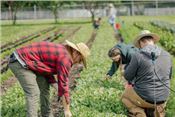Center For Arkansas Farms And Food Teaching Sustainable Farming Methods
AMY CHAPEN PATTON
FAYETTEVILLE, ARKANSAS
On an early spring morning, a verdant field is flail mowed at the Center for Arkansas Farms and Food. The vegetation growing there is a winter cover crop mix that has blanketed the earth throughout the cold winter months.
“This winter cover crop serves as a natural weed barrier, prevents runoff and erosion, sequesters carbon and nutrients, and invites beneficial insects,” said Jonathan McArthur, CAFF's farm manager, and field educator.
After flailing, the cover crop is worked into the soil to provide nutrients for the primary vegetable crop. Hard-working cover crops like this are part of the sustainability practices implemented at the CAFF Farm, located at the University of Arkansas System Division of Agriculture Research Center in Fayetteville. Each method put into practice provides CAFF Farm School students with hands-on experience learning sustainable practices and tools for their future farms.
The learning at CAFF is one aspect of the sustainability efforts by the University of Arkansas System Division of Agriculture. Others include the Arkansas Discovery Farms, a suite of decision tools for nutrient use, and the development of new techniques and equipment to preserve water quality and quantity.
McArthur said other methods used on the CAFF farm include integrative pest management, crop rotation, drip irrigation, no-till, and low-till strategies. Each of these helps to improve or protect the soil, reduce the use of pesticides and herbicides, and cut back on water consumption, he said, “Historically, people grew much of their food. That has changed,” said Heather Friedrich, program manager for the Center for Arkansas Farms and Food. “Growing a sufficient amount to feed our rapidly increasing populations puts pressure on natural resources. This is especially true when we take more from the soil than we give back.
“Sustainable farming is an attempt to work in alignment with our natural resources to produce healthy food for our communities,” she said.
Pillars of sustainability
“The three pillars of sustainable farming are social, including people and communities, profits, and the environment,” Friedrich said. Proponents view these pillars as interconnected with wider benefits that have a ripple effect across the community. For example, sustained soil health improves the production and nutrition of vegetables.
“The farm’s harvest provides people in the community with high- quality, fresh food which supports healthy lives,” she said. “Farms are small businesses that boost the local economy and provide jobs.
Having plenty of food grown locally improves the regional supply chain for area restaurants and grocers.”
Insects, water, transportation
Other aspects of sustainability include reducing runoff, keeping excess nutrients or chemical crop managing tools out of the local waterways, and easing burdens on water treatment plants.
“Beneficial insects encouraged on the farm will expand out to home gardens and other nearby farms,” McArthur said. “They also reduce the need for pesticides. In all of these ways, the farm is directly connected to the local community, economy, and environment.
“Supporting and teaching sustainable farm production practices is a core goal of the CAFF program,” Friedrich said. “Sustainability methods are at the core of the curriculum for the CAFF Farm School, the Apprenticeship Program, and Beginning Farmer Classes. Several methods are integrated into the CAFF model farm, where students learn by experience.
“Each of the mentor farms participating in the CAFF Farm Apprenticeship Program uses sustainability methods and teaches them to their apprentices,” she said. “Through these programs, CAFF provides hands-on learning opportunities in sustainable farming practices to the next generation of farmers.”
Sustainable practices for all farmers
While CAFF trains new farmers, Friedrich said established farmers, whether they are growing row crops, livestock, or specialty crops are also exploring sustainability.
“Farmers, new or established, can learn more about sustainability through CAFF programs. In addition to the CAFF Farm School and Apprenticeship Program, there are Beginning Farmer Classes offered on Zoom and cost just $10 each,” Friedrich said. The CAFF YouTube channel is another resource with informative videos. CAFF sponsors speakers and events that are open to farmers at all levels throughout the year. ∆
AMY CHAPEN PATTON: University of Arkansas

Jonathan McArthur, farm manager, and field educator for the Center for Arkansas Farms and Food, working with students. May 11, 2021.
U of A System Division of Agriculture file photo